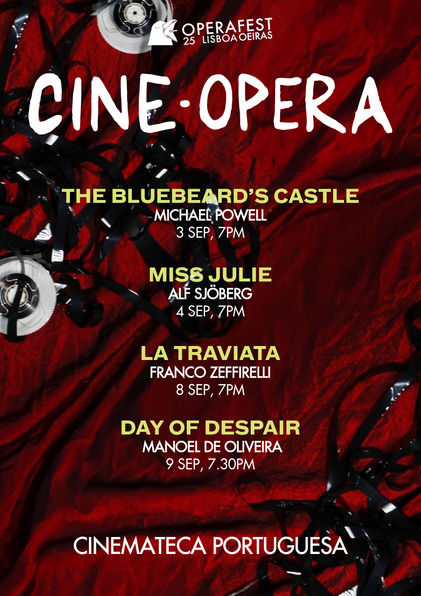Operafest Lisboa 2025
Cine-Opera
Cine-Opera
3 to 9 SEP
Cinemateca Portuguesa
"Bluebeard's Castle" by Michael Powell
"Miss Julie" byAlf Sjöberg
"Day of Despair" by Manoel de Oliveira
"La Traviata" by Franco Zeffirelli
The Cine-Opera cycle in partnership with the Cinemateca Portuguesa, around the multiple contagions between cinema and opera and of course focusing on the theme of forbidden love, proposes unbeatable film versions of great classics of this edition, such as "La Traviata" by Franco Zeffirelli (1982), starring Teresa Stratas and Plácido Domingo, the enigmatic "Bluebeard's Castle" by director Michael Powell (1963) the only opera and masterpiece by the Hungarian composer, Béla Bartók. "Miss Julie" by Alf Sjöberg (1951), evoking "Fröken Julie" by Strindberg and celebrating the two hundredth anniversary of the birth of Camilo Castelo Branco, one of the most extraordinary Portuguese novelists of all time: "Day of Despair" by Manoel de Oliveira (1992).
3 SEP | 19h
"Bluebeard's Castle"
Michael Powell
Cinemateca Portuguesa
with Norman Foster, Anna Raquel Sartre
Germany, 1964 - 60 min
electronically subtitled in Portuguese | M/12
The only opera composed by Béla Bartók, with a libretto by Béla Balázs, premiered in 1918 in Budapest. Michael Powell based it on one of his most beautiful and least known films, marked by a delirious and fantastical visual style in which the colors "seem to construct the form itself." One of the very rare examples of opera in cinema, entirely accomplished and entirely magical.
4 SEP | 19h
"Fröken Julie"
Alf Sjöberg
Cinemateca Portuguesa
with Anita Björk, Ulf Palme, Märta Dorff, Lissi Alandh, Anders Henrikson, Max von Sydow
Sweden, 1951 - 90 min
electronically subtitled in Portuguese | M/16
Adaptation of the eponymous drama by August Strindberg, which became one of the greatest works of Swedish cinema, innovative in its camerawork, discontinuity of narrative, and audacious eroticism (for the time).
8 SEP | 19h30
"La Traviata"
Franco Zeffirelli
Cinemateca Portuguesa
with Teresa Stratas, Plácido Domingo, Cornell MacNeill
Italy, 1981 - 110 min
electronically subtitled in Portuguese | M/12
La Traviata, one of Verdi's most beautiful operas, is brought to the big screen by Franco Zeffirelli, an opera producer and director of film adaptations of literary classics (such as Shakespeare), accompanied by the baton of James Levine and the Metropolitan Opera. Starring soprano Teresa Stratas and tenor Plácido Domingo, the story is taken from another classic, Alexandre Dumas's The Lady of the Camellias, about the illicit love between a courtesan and a young bourgeois, whose relationship is disrupted by his father for the sake of the family's place in French society. These are the tragic traits that inevitably and inexorably recur in LA TRAVIATA, where Zeffirelli's talent for art direction and eye for costume design lead him to create a world that is luxurious yet unobtrusive, placing the focus firmly on the performers and their voices. The director uses the 1958 staging he did with Maria Callas in Dallas, Texas, to show us the narrative outcome first, with the opera's three acts as a flashback. One of Akira Kurosawa's 100 favorite films.
9 SEP | 19h
The Day of Despair
Manoel de Oliveira
Cinemateca Portuguesa
with Mário Barroso, Teresa Madruga, Luis Miguel Cintra, Diogo Dória
Portugal, 1992 - 76 min
M/12
Oliveira explores Camilo Castelo Branco's final years through the writer's letters, reflecting on his conflicts and dramas, as well as his tormented relationship with Ana Plácido. Filmed entirely at Camilo's house in S. Miguel de Seide, it is one of Oliveira's most austere films. The shot that follows the carriage wheels at the beginning of the film, as well as the final long shot, make The Day of Despair an elucidating example of Oliveira's use of them.
Operafest Lisboa 2025
Cine-Opera
Cine-Opera
3 to 9 SEP
Cinemateca Portuguesa
"Bluebeard's Castle" by Michael Powell
"Miss Julie" byAlf Sjöberg
"Day of Despair" by Manoel de Oliveira
"La Traviata" by Franco Zeffirelli
The Cine-Opera cycle in partnership with the Cinemateca Portuguesa, around the multiple contagions between cinema and opera and of course focusing on the theme of forbidden love, proposes unbeatable film versions of great classics of this edition, such as "La Traviata" by Franco Zeffirelli (1982), starring Teresa Stratas and Plácido Domingo, the enigmatic "Bluebeard's Castle" by director Michael Powell (1963) the only opera and masterpiece by the Hungarian composer, Béla Bartók. "Miss Julie" by Alf Sjöberg (1951), evoking "Fröken Julie" by Strindberg and celebrating the two hundredth anniversary of the birth of Camilo Castelo Branco, one of the most extraordinary Portuguese novelists of all time: "Day of Despair" by Manoel de Oliveira (1992).
3 SEP | 19h
"Bluebeard's Castle"
Michael Powell
Cinemateca Portuguesa
with Norman Foster, Anna Raquel Sartre
Germany, 1964 - 60 min
electronically subtitled in Portuguese | M/12
The only opera composed by Béla Bartók, with a libretto by Béla Balázs, premiered in 1918 in Budapest. Michael Powell based it on one of his most beautiful and least known films, marked by a delirious and fantastical visual style in which the colors "seem to construct the form itself." One of the very rare examples of opera in cinema, entirely accomplished and entirely magical.
4 SEP | 19h
"Fröken Julie"
Alf Sjöberg
Cinemateca Portuguesa
with Anita Björk, Ulf Palme, Märta Dorff, Lissi Alandh, Anders Henrikson, Max von Sydow
Sweden, 1951 - 90 min
electronically subtitled in Portuguese | M/16
Adaptation of the eponymous drama by August Strindberg, which became one of the greatest works of Swedish cinema, innovative in its camerawork, discontinuity of narrative, and audacious eroticism (for the time).
8 SEP | 19h30
"La Traviata"
Franco Zeffirelli
Cinemateca Portuguesa
with Teresa Stratas, Plácido Domingo, Cornell MacNeill
Italy, 1981 - 110 min
electronically subtitled in Portuguese | M/12
La Traviata, one of Verdi's most beautiful operas, is brought to the big screen by Franco Zeffirelli, an opera producer and director of film adaptations of literary classics (such as Shakespeare), accompanied by the baton of James Levine and the Metropolitan Opera. Starring soprano Teresa Stratas and tenor Plácido Domingo, the story is taken from another classic, Alexandre Dumas's The Lady of the Camellias, about the illicit love between a courtesan and a young bourgeois, whose relationship is disrupted by his father for the sake of the family's place in French society. These are the tragic traits that inevitably and inexorably recur in LA TRAVIATA, where Zeffirelli's talent for art direction and eye for costume design lead him to create a world that is luxurious yet unobtrusive, placing the focus firmly on the performers and their voices. The director uses the 1958 staging he did with Maria Callas in Dallas, Texas, to show us the narrative outcome first, with the opera's three acts as a flashback. One of Akira Kurosawa's 100 favorite films.
9 SEP | 19h
The Day of Despair
Manoel de Oliveira
Cinemateca Portuguesa
with Mário Barroso, Teresa Madruga, Luis Miguel Cintra, Diogo Dória
Portugal, 1992 - 76 min
M/12
Oliveira explores Camilo Castelo Branco's final years through the writer's letters, reflecting on his conflicts and dramas, as well as his tormented relationship with Ana Plácido. Filmed entirely at Camilo's house in S. Miguel de Seide, it is one of Oliveira's most austere films. The shot that follows the carriage wheels at the beginning of the film, as well as the final long shot, make The Day of Despair an elucidating example of Oliveira's use of them.
Production

Institutional Partner &
Programming Partner

Structure Financed by


Patrons

Institutional Partner



Institutional Support


Co-Production


Programming Partners





Support


Media Partners



Operafest Lisboa 2025 ©
Production

Institutional Partner &
Programming Partner

Structure Financed by


Patrons

Institutional Partner



Institutional Support


Co-Production


Programming Partners





Support


Media Partners



Operafest Lisboa 2025 ©
Operafest Lisboa 2025 ©

